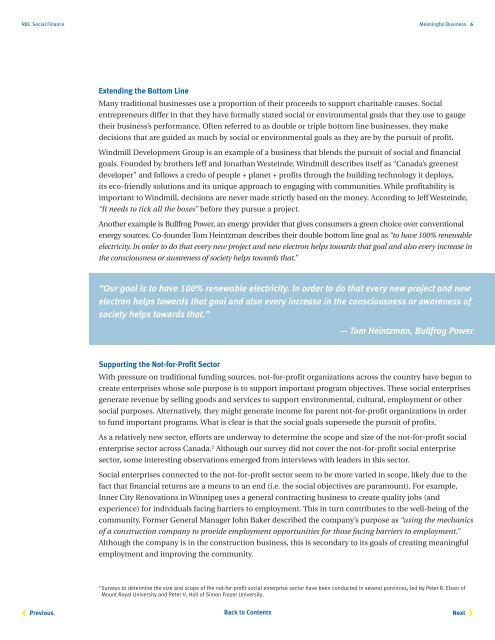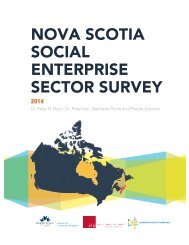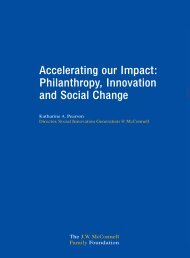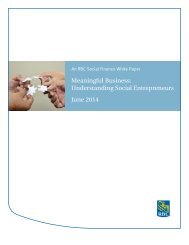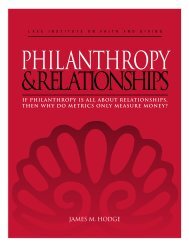Meaningful Business: Understanding Social Entrepreneurs June 2014
You also want an ePaper? Increase the reach of your titles
YUMPU automatically turns print PDFs into web optimized ePapers that Google loves.
RBC <strong>Social</strong> Finance<br />
<strong>Meaningful</strong> <strong>Business</strong> 6<br />
Extending the Bottom Line<br />
Many traditional businesses use a proportion of their proceeds to support charitable causes. <strong>Social</strong><br />
entrepreneurs differ in that they have formally stated social or environmental goals that they use to gauge<br />
their business’s performance. Often referred to as double or triple bottom line businesses, they make<br />
decisions that are guided as much by social or environmental goals as they are by the pursuit of profit.<br />
Windmill Development Group is an example of a business that blends the pursuit of social and financial<br />
goals. Founded by brothers Jeff and Jonathan Westeinde, Windmill describes itself as “Canada’s greenest<br />
developer” and follows a credo of people + planet + profits through the building technology it deploys,<br />
its eco-friendly solutions and its unique approach to engaging with communities. While profitability is<br />
important to Windmill, decisions are never made strictly based on the money. According to Jeff Westeinde,<br />
“It needs to tick all the boxes” before they pursue a project.<br />
Another example is Bullfrog Power, an energy provider that gives consumers a green choice over conventional<br />
energy sources. Co-founder Tom Heintzman describes their double bottom line goal as “to have 100% renewable<br />
electricity. In order to do that every new project and new electron helps towards that goal and also every increase in<br />
the consciousness or awareness of society helps towards that.”<br />
“Our goal is to have 100% renewable electricity. In order to do that every new project and new<br />
electron helps towards that goal and also every increase in the consciousness or awareness of<br />
society helps towards that.”<br />
— Tom Heintzman, Bullfrog Power<br />
Supporting the Not-for-Profit Sector<br />
With pressure on traditional funding sources, not-for-profit organizations across the country have begun to<br />
create enterprises whose sole purpose is to support important program objectives. These social enterprises<br />
generate revenue by selling goods and services to support environmental, cultural, employment or other<br />
social purposes. Alternatively, they might generate income for parent not-for-profit organizations in order<br />
to fund important programs. What is clear is that the social goals supersede the pursuit of profits.<br />
As a relatively new sector, efforts are underway to determine the scope and size of the not-for-profit social<br />
enterprise sector across Canada. 2 Although our survey did not cover the not-for-profit social enterprise<br />
sector, some interesting observations emerged from interviews with leaders in this sector.<br />
<strong>Social</strong> enterprises connected to the not-for-profit sector seem to be more varied in scope, likely due to the<br />
fact that financial returns are a means to an end (i.e. the social objectives are paramount). For example,<br />
Inner City Renovations in Winnipeg uses a general contracting business to create quality jobs (and<br />
experience) for individuals facing barriers to employment. This in turn contributes to the well-being of the<br />
community. Former General Manager John Baker described the company’s purpose as “using the mechanics<br />
of a construction company to provide employment opportunities for those facing barriers to employment.”<br />
Although the company is in the construction business, this is secondary to its goals of creating meaningful<br />
employment and improving the community.<br />
2<br />
Surveys to determine the size and scope of the not-for-profit social enterprise sector have been conducted in several provinces, led by Peter R. Elson of<br />
Mount Royal University and Peter V. Hall of Simon Fraser University.<br />
< Previous<br />
Back to Contents Next >


